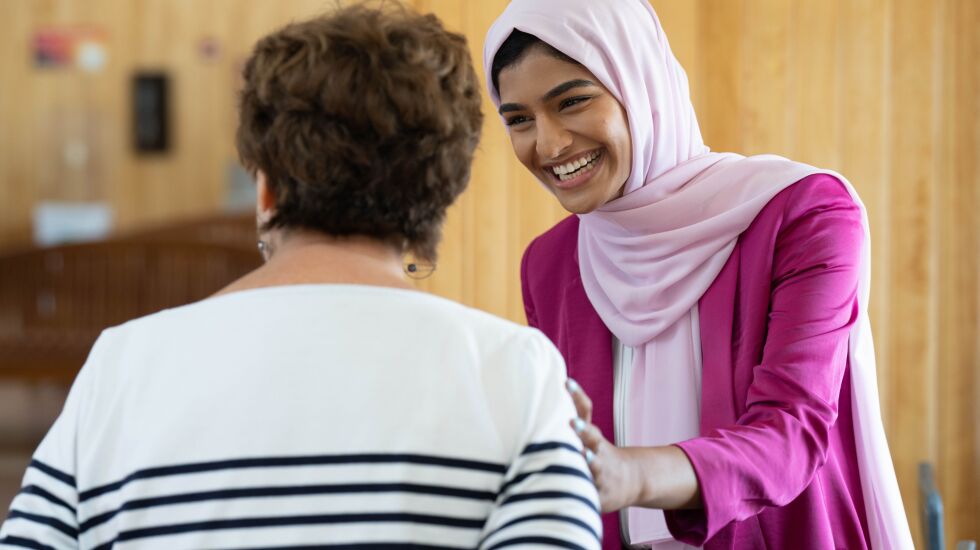
When Barack Obama was running for president, he was forced to repeatedly soothe the sensibilities of many Americans who couldn’t fathom a leader who required less sun protection than they did and had a name that would never show up on a cheap gas station keychain.
Anyone in Obama’s orbit who courted controversy, including his longtime pastor Jeremiah Wright, was thrust aside.
And the metastasized lie that Obama shared the same religion as his father, stepfather and other members of his extended family was contested with such intensity, it was clear voters on both sides of the political aisle equated Muslims with a threatening foreignness and depravity. To prove Obama was not in any way affiliated with “those people,” his volunteers even kept two women in hijab from sitting behind the then-Democratic presidential candidate at a rally in Detroit.
Much has changed since that summer of 2008. There are two Muslim women who now walk the halls of the U.S. Capitol, Rep. Rashida Tlaib, D-Mich., and the hijab-wearing Rep. Ilhan Omar, D-Minn. Here in our state, two Muslims — Abdelnasser Rashid and Nabeela Syed, a young progressive of Indian descent who covers her hair — were just sworn into the Illinois General Assembly.
But while the racial, ethnic and religious makeup of our elected officials inches toward reflecting the country’s diversity, the terrorizing push-back sanctioned by Donald Trump and other right-wing leaders has become normalized zealotry, fueled by violence and ignorance.
More than one in three Americans and more than half of Republicans — 56% — agree that “the traditional American way of life is disappearing so fast” that “force” may be necessary “to save it,” according to 2021 study by Survey Center on American Life.
In that same vein, a report released over a week ago by the Giffords Law Center to Prevent Gun Violence found that gun threats against federal lawmakers rose between January 2021 and October 2022. Female legislators and legislators of color were disproportionately targeted.
When so many Americans are deluded enough to believe their intolerance and physical attacks are feats of patriotism, those on the receiving end must speak out.
Asian American politicians, including Syed, and those from the community who ran for office in the past are being encouraged to participate in a survey that will pinpoint how widespread intimidation and violence against Asian American leaders and candidates is, and whether women within these groups bear the brunt of the abuse.
More specifically, the purpose of the upcoming study — Violence Against Asian American Women in Politics — is to document and examine how these experiences influence candidacies, representation and political ambition, according to its authors, Paru Shah, a political science professor at the University of Wisconsin-Milwaukee; and Sameena Mustafa, my childhood friend who ran against U.S. Rep. Mike Quigley, D-Ill, in 2018.

There’s not a lot of academic research that zeroes in on Asian Americans in politics and the barriers they may encounter, said Grace Chan McKibben, a Hyde Park resident who ran for an Illinois House seat five years ago.
“I think it’s important to do some research and get real numbers and see how serious the problem is or even if it’s a problem,” said Chan McKibben, the executive director of the Coalition for a Better Chinese American Community.
Quantifying anecdotes will not only address the severity of the challenges — it can help identify solutions and boost solidarity with other people of color, added Syamala Krishnamsetty, a past candidate for state representative in the 40th District.
Krishnamsetty, of Albany Park, didn’t deal with much racism on the campaign trail in 2020, but said the sexism was palpable.
“You’re lucky you don’t get raped,” Krishnamsetty was told once as she knocked on doors.
The blatant aggression from the right is an obvious obstacle, but political candidates from marginalized communities can also be dragged down by so-called allies.
“Witch,” is how one member of a grassroots progressive organization referred to Krishnamsetty during an endorsement interview.
In the midst of Mustafa’s own brief stint in politics, she said both an Obama appointee and a former aide to his top adviser attempted to “discredit me as a Muslim woman of color without seeing the irony and hypocrisy in their actions.”
The study, funded by Rutgers University’s Center on American Women and Politics, isn’t just personal. The findings ultimately can be a tool to help ensure our democracy remains intact and that it is truly equitable, Mustafa said.
“After the January 6 insurrection and the explosion of anti-Asian hate crimes, I realized that our experiences needed to be collected and used to better protect and advise future leaders,” she said.
For our diverse Asian American community, which has been mostly disregarded even as its population has skyrocketed within the last two decades, we need all the answers we can get.
Rummana Hussain is a columnist and member of the Sun-Times Editorial Board.
Want to write a letter to the editor or an op-ed? Check out our guidelines.







